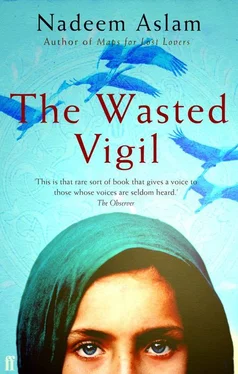Nadeem Aslam - The Wasted Vigil
Здесь есть возможность читать онлайн «Nadeem Aslam - The Wasted Vigil» весь текст электронной книги совершенно бесплатно (целиком полную версию без сокращений). В некоторых случаях можно слушать аудио, скачать через торрент в формате fb2 и присутствует краткое содержание. Год выпуска: 2009, Издательство: Faber and Faber, Жанр: Современная проза, на английском языке. Описание произведения, (предисловие) а так же отзывы посетителей доступны на портале библиотеки ЛибКат.
- Название:The Wasted Vigil
- Автор:
- Издательство:Faber and Faber
- Жанр:
- Год:2009
- ISBN:нет данных
- Рейтинг книги:4 / 5. Голосов: 1
-
Избранное:Добавить в избранное
- Отзывы:
-
Ваша оценка:
- 80
- 1
- 2
- 3
- 4
- 5
The Wasted Vigil: краткое содержание, описание и аннотация
Предлагаем к чтению аннотацию, описание, краткое содержание или предисловие (зависит от того, что написал сам автор книги «The Wasted Vigil»). Если вы не нашли необходимую информацию о книге — напишите в комментариях, мы постараемся отыскать её.
The Wasted Vigil — читать онлайн бесплатно полную книгу (весь текст) целиком
Ниже представлен текст книги, разбитый по страницам. Система сохранения места последней прочитанной страницы, позволяет с удобством читать онлайн бесплатно книгу «The Wasted Vigil», без необходимости каждый раз заново искать на чём Вы остановились. Поставьте закладку, и сможете в любой момент перейти на страницу, на которой закончили чтение.
Интервал:
Закладка:
They are saying that the building next to the school was a warehouse for storing heroin. It belonged to Gul Rasool, the man who is the court of appeal in all matters in Usha. If the intended target was the warehouse, then Nabi Khan must be alive. It must be him, trying to strike a blow against his enemy. But the statement left behind by the suicide bomber had hinted strongly that the school was the target. It had ended with the words Death to America .
A rumour has also spread that the bombing was carried out by the Americans themselves so that the concept of jihad can be blamed and discredited.
He sits quietly at the table with Lara and Marcus, listening to their talk. Twice during the months he knew her, Zameen woke up screaming from a dream of being assaulted by the Soviet soldier. Memories rising in her like bruises as he held her. A dream of lying lifeless on the floor, the attacker manipulating her body ‘as when a corpse is washed before burial’, arranging her limbs before beginning. ‘Of course he committed a crime,’ she said, ‘and if these were normal times I would have liked to have seen him brought to justice. What else can I say? That doesn’t change the fact that I am grateful he helped me escape from the military base. He may have saved my life. When I think of that I hope he’s all right, wherever he is.’
When he is not with the other two inhabitants of the house, David walks through the orchard and the garden, some younger stems as slender as nai flutes. One night he builds a fire at the water’s edge. As a young man he had gone to Berkeley for a university interview and, having stood on the roof of the astronomy building and looked out at San Francisco Bay with its sailboats, had made his decision. He bought an ancient twenty-seven-foot boat and for the next four years lived on it in the Berkeley marina. And every time he has visited Marcus, this lake has begged to be paddled on. This time he has brought with him from the United States the basic materials to construct a birch-bark canoe, having contemplated spending a week or so building it here; from a storeroom in the half-ruined school in Jalalabad he brings it all to Usha one day, unloading it into an unused room. Visiting the lakes of the northern United States as a child, in the company of his brother Jonathan and an uncle, he had seen a sea of wild rice engulf an Ojibwa woman seated in a canoe. A slide into harvest: she gently bent the slender stalks that were sticking out of the water’s surface and knocked the grain into her vessel, to sell for twenty-five cents a pound. The last armed conflict between the United States military forces and the Native Americans had taken place right there on Leech Lake in 1898. White officers and troops — and around them in the forest, circling quietly on the icy ground, nineteen Natives with Winchester rifles.
He walks around the house, reacquainting himself with it. The broken painted couples enclose him when he enters the room at the top. On the walls of muted gold, they are either in union or keeping vigils for each other in grove and pavilion. Waiting. On first walking in he has to halt mid-step — seeing the hundreds of coloured fragments arranged on the floor. Initially he is not sure what they mean but circling around them he discovers the vantage from where they do not appear arbitrary and the image is the right way up.
A man and a woman.
‘I’ll pick these up. Do you wish to use the room?’ Lara has come in.
‘Don’t put them away on my account, please. I was just going around the house, reminding myself of things.’
Having removed an oval piece on which the strings of a harp are painted — just a few black lines made as though by ink-dipped twigs — she lets her hand remain some inches off the floor, the limb suspended in the air irresolutely, and then she puts it back and stands up.
They look at each other, and he doesn’t know how to fill the silence and then she withdraws.
He moves towards the windowsill to gaze at that vast sky of Asia, caught between inside and outside.
*
It was here in this part of the world that David had heard for the first time the call for America’s death. A mob fired by visions of a true Islamic society, shouting, ‘Kill All Americans!’, ‘President Carter the Dog Must Die!’ It was in Islamabad, Pakistan, in November 1979. He was twenty-two.
At the beginning of November a group of protesters in Iran had stormed the American embassy in Tehran, taking forty-nine Americans hostage. And seventeen days later David had arrived in Islamabad, very late in the evening, falling asleep almost immediately in his hotel room owing to the exhaustion of the travel. He had finished college for now and intended to spend the fall months travelling in northern Afghanistan, something he had wanted to do for some years. His plan was to go from Islamabad to Peshawar, and from there — one long road full of twists, veering like a kite’s tail — move on through the Khyber Pass to the city of Jalalabad and then on to Kabul. The languages around him were still many-lettered lumps in his mouth and ears but he was sure he could get by. Seven days a week for eight weeks — he had taken a course in ancient Greek during the summer, discovering suddenly that he had a gift for languages, and he carried with him a copy of the oldest surviving Greek tragedy, the Persians , Aeschylus contemplating the East’s grief and shock at finding itself defeated by the West.
While he slept, Saudi national guardsmen encircled the Kaaba, the Grand Mosque in Mecca, Saudi Arabia. A delusional fundamentalist had declared himself the Messiah and, having barricaded himself inside the mosque with his followers a few hours earlier, opened fire on the worshippers. The fanatics — they wanted a purer Islam implemented in Arabia, calling for song, music, film and sports to be banned — had smuggled in their assault rifles and grenades in coffins, the mosque being a common place to bless the dead. The Saudi government did not tell anyone who was responsible for the invasion of the holiest site in Islam, the place every single practising Muslim turned his face to five times a day. Not long after David Town got up on the morning of 21 November, the rumour spread through all the cities of Islam — from country to country, continent to continent — that the killings in the Kaaba were carried out by Americans as a blow against Islam, perhaps in retaliation for the Tehran embassy siege.
He didn’t know about this rumour when he left his hotel. He had to visit the US embassy to be updated on the situation in Afghanistan. The rebellion against the Communist government, begun back in the spring, had now spread to most provinces there.
At a pedestrian crossing he reached into his pocket and pulled out a small notebook to check something. Last night while having dinner at the hotel, he had had a brief conversation with a Pakistani man at the next table. Upon learning of David’s interest in gems, the delightful pedant told him that the Emperor Shah Jahan’s wealth had included eighty-two pounds of diamonds, 110 pounds of rubies, 275 pounds of emeralds, fifty-five pounds of jade and two thousand spinels. David had written it all down, but now, this morning, he wanted to confirm that another detail had been committed to paper: the treasury also contained four thousand living songbirds.
He glanced at the page and just at that moment the car that had come to a halt to allow him to cross, with its front fender only two feet away from him, jerked forward by six inches. The driver had decided to startle him for sport. He gave the windshield a cursory look and continued without breaking his stride — not in all honesty due to strong nerves, but because he was distracted by the four thousand birds and hadn’t really seen the car move until it had already come to a stop, knew he wasn’t about to be run over.
Читать дальшеИнтервал:
Закладка:
Похожие книги на «The Wasted Vigil»
Представляем Вашему вниманию похожие книги на «The Wasted Vigil» списком для выбора. Мы отобрали схожую по названию и смыслу литературу в надежде предоставить читателям больше вариантов отыскать новые, интересные, ещё непрочитанные произведения.
Обсуждение, отзывы о книге «The Wasted Vigil» и просто собственные мнения читателей. Оставьте ваши комментарии, напишите, что Вы думаете о произведении, его смысле или главных героях. Укажите что конкретно понравилось, а что нет, и почему Вы так считаете.












